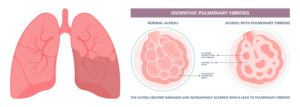Interstitial Lung Disease
Interstitial lung disease (ILD) is a group of chronic lung disorders that affect the interstitium, which is the tissue and space surrounding the air sacs (alveoli) in the lungs. In ILD, the interstitium becomes inflamed and scarred, leading to impaired lung function and reduced oxygen exchange between the lungs and the bloodstream.
There are various types of interstitial lung disease, and they can have different causes, such as exposure to environmental toxins, certain medications, autoimmune diseases, and infections. Some common forms of ILD include idiopathic pulmonary fibrosis (IPF), sarcoidosis, and connective tissue disease-associated ILD.

Symptoms of Interstitial Lung Disease:
The symptoms of interstitial lung disease can be similar to those of other lung conditions and may include:
1. Shortness of breath: Initially during physical activity and later at rest.
2. Dry, persistent cough: A cough that doesn't produce mucus.
3. Fatigue and weakness: Due to decreased oxygen levels in the blood.
4. Chest discomfort or pain: Usually mild and may worsen with deep breathing.
Management of Interstitial Lung Disease:
The management of ILD aims to slow disease progression, relieve symptoms, and improve the patient's quality of life. The treatment approach may vary depending on the specific type and cause of interstitial lung disease. Some common management strategies include:

1. Medications: Corticosteroids may be used to reduce inflammation in the lungs and slow disease progression. Other immunosuppressive drugs, such as azathioprine or mycophenolate, can be prescribed for certain forms of ILD associated with autoimmune conditions.
2. Oxygen Therapy: Supplemental oxygen is provided to maintain adequate blood oxygen levels and reduce breathlessness.
3. Pulmonary Rehabilitation: A comprehensive program that includes exercise, breathing techniques, and education to improve lung function and physical conditioning.
4. Lifestyle Adjustments: Avoiding exposure to known environmental toxins or irritants that can worsen ILD.
5. Management of Comorbidities: Addressing other medical conditions that may contribute to or exacerbate ILD.
6. Lung Transplantation: For individuals with advanced or severe ILD, lung transplantation may be considered in some cases.
It's important for individuals with interstitial lung disease to work closely with a multidisciplinary healthcare team, including pulmonologists, respiratory therapists, and other specialists. Regular follow-ups and monitoring are crucial to assess disease progression and treatment response. The management of ILD is generally focused on improving symptoms, maintaining lung function, and enhancing the overall well-being of the patient.

